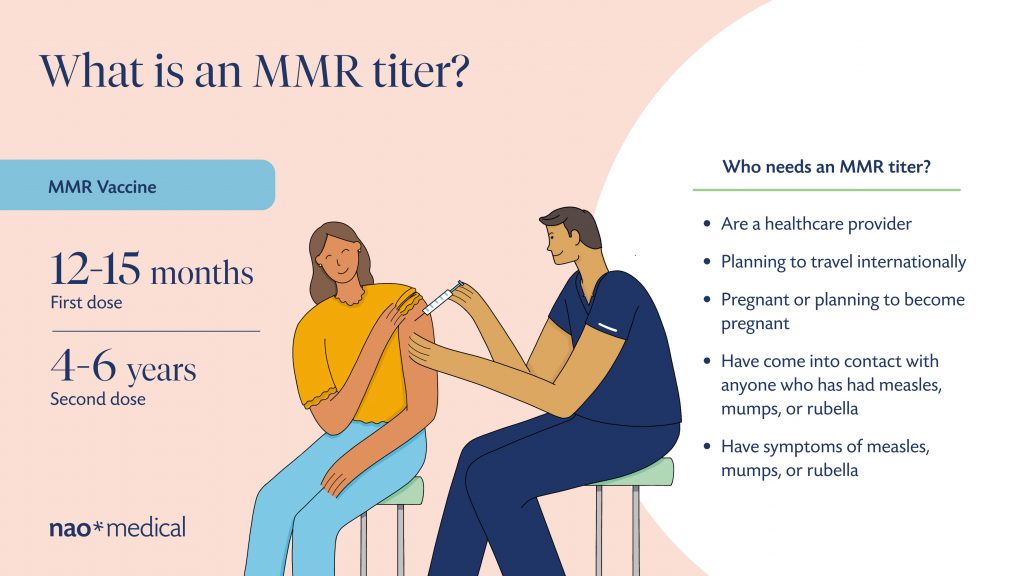
Measles, mumps, and rubella or MMR are three serious viral diseases that can be deadly. The MMR vaccine protects against three serious diseases: mumps, measles, and rubella. According to the Centers for Disease Control and Prevention (CDC), all children should get two doses of MMR vaccines.
The first dose of the MMR vaccine is typically given to toddlers 12 to 15 months of age. Doctors give it again when the child is between four to six years of age.
MMR vaccination is especially important for specific groups, such as healthcare workers and international travelers. For these groups of people, sometimes a healthcare provider will recommend an MMR titer to determine the level of immunity against these diseases. Healthcare workers might also need an MMR titer to ensure adequate protection against measles, mumps, and rubella.
If you are traveling internationally and your MMR antibodies are low, then you might need another vaccination or booster. An MMR titer will help you figure out the level of antibodies in your blood.
What is an MMR titer?
An MMR antibody titer is a test that determines how many MMR antibodies you have within your bloodstream. The more MMR antibodies you have in your blood, the greater your immunity to measles, mumps, and rubella.
If you had the MMR vaccine as a child, your body generates these antibodies. The level of these antibodies needs to be above a certain level for immunity against measles, mumps, and rubella.
What can an MMR titer reveal?
An antibody titer test can help determine if you need another MMR vaccine or booster shot. It can also help determine whether or not:
- You currently have mumps, measles, or rubella
- Your immune system has a strong enough response to protect against the infection
- You’ve ever had one of these three viral infections
Who needs an MMR titer?
You may need this test if you:
- Are a healthcare provider
- Planning to travel internationally
- Pregnant or planning to become pregnant
- Have come into contact with anyone who has had measles, mumps, or rubella
- Have symptoms of measles, mumps, or rubella
Sometimes, you will have to prove immunity to measles, mumps, and rubella if you are starting a new job, enrolling in a college or university, or volunteering (especially overseas). The MMR titer can be used to help prove immunity and prevent the spread of these serious diseases.
How do I prepare for the test?
Before getting your MMR titer, make sure to tell your doctor about any medications that you are taking — both prescription and over the counter medications or supplements.
If you are undergoing chemotherapy, let your healthcare provider know. Research has shown that people receiving chemo have a decrease in antibody levels.
What happens during the test?
The MMR antibody titer is a very simple blood test. The doctor or healthcare provider will clean and sterilize the site where the blood will be taken. Next, they will tie a band right above the site where the blood will be taken.
The healthcare provider will then remove the needle and a piece of gauze will be used to stop the bleeding. A bandage will then be placed on the site. You are then free to leave.
What are the risks of an MMR titer test?
Generally, there are very few risks with this test. As with any other blood test, you might experience soreness, bruising, or redness at the site where blood is taken. An infection could also occur.
Some people feel dizzy or faint at the sight of blood. If this has happened to you in the past, let the healthcare provider know before the test.
What happens if the test is abnormal?
There could be several reasons for an abnormal MMR titer test. It could indicate an immune disorder. An abnormal test could indicate a current or past measles, mumps, or rubella infection. Or, it could just mean that you need another MMR vaccine.
An MMR titer is an important test for anyone who wants to be sure they are adequately protected from measles, mumps, and rubella infections. Visit a Nao Medical urgent care location near you today to make sure you’re protected against these potentially fatal diseases.







 (917) 310-3371
(917) 310-3371











